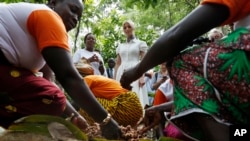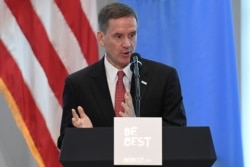Vivian Chakarian contributed to this report.
Updated July 20, 2019, at 9:50 p.m.
WHITE HOUSE - A White House initiative spearheaded by Ivanka Trump to empower women around the developing world economically, announced its initial achievements, including $27 million in grants for projects in 22 countries.
The project also reported its first substantial success: backing a change in Ivory Coast family law to make it more equitable to women.
Speaking in a panel discussion co-hosted by the U.S. Agency for International Development (USAID) on Wednesday, Ivanka Trump emphasized that economic empowerment of women is “smart from a development assistance standpoint” and “critically important from a national security perspective.”
If you look at the countries that have high levels of gender discrimination, “80% of them have experienced armed conflict in the last two decades,” said Trump, daughter of President Donald Trump.
Women’s development initiative
The Women’s Global Development and Prosperity Initiative (W-GDP) was launched in February with an initial investment of $50 million from the USAID. Its goal is to reach 50 million women in the developing world by 2025 through U.S. government activities, private-public partnerships, and a new “incentive” fund that promotes those partnerships with businesses and NGOs.
USAID Administrator Mark Green noted that “investing in women builds countries that are resilient and self-reliant.”
The projects include an effort in Rwanda to help women into the country’s energy sector, a Latin American initiative that aims to equip women with the skills needed to work in the tech sector in Brazil, Chile, Colombia, Mexico and Peru, and a program helping women working in Indonesia’s poultry industry.
In her remarks, Ivanka Trump, an adviser to the president, pointed to the government of Ivory Coast, which has recently updated the country’s family laws to make them more equitable to women, changes she pushed for during her meeting with Vice President Daniel Kablan Duncan on her trip to Abidjan in April.
“We were really excited to applaud and celebrate Cote d’Ivoire changing their marriage law, which will now enable women to inherit property and to acquire property, which was previously not allowed under the law,” Trump said, using the official country name.
In 2018, the World Economic Forum ranked Ivory Coast 131 out of 144 in gender equality, and the government has pledged to improve conditions for women as part of the terms for obtaining U.S. government grants through the Millennium Challenge Corporation.
MCC is an independent foreign assistance agency that leads U.S. government’s efforts in the fight against global poverty, created with bipartisan support by Congress in 2004.
US policy continuation
Trump touts the initiative as the “first whole-of-government effort to advance global women’s economic empowerment,” but incorporating women’s economic empowerment goals as part of U.S. foreign policy strategy is a continuation of previous administrations’ policies.
The U.S. government has a track record of using foreign assistance programs to incentivize governments around the world to tackle legal barriers to women’s economic participation, said Jamille Bigio, senior fellow in the Women and Foreign Policy program at the Council on Foreign Relations. She was also the director for human rights and gender on the White House National Security Council during the Obama administration.
The MCC “actually determines whether to invest in a given country in part based on women’s workforce equality,” said Bigio, noting that foreign governments in the past have taken action as they have vied for U.S. investment with MCC support. She cited the case of Lesotho ending women’s status as minors under the law in 2006.
Daniel Runde, director of the Project on Prosperity and Development at the Center for Strategic and International Studies, noted that while there have been “decades of work” from the U.S. government on women’s economic development, it is true that Ivanka Trump is trying to bring in all the various parts of U.S. government working on this issue in a “more intentional way.”
“The question is, how can the administration not only scale this but also do work that is additional and complimentary, and not duplicative of other activities, including those of the Word Bank?” Runde asked.
Incentivize change
U.S. development initiatives, including W-GDP, that incentivize countries to change their laws to improve the lives of minorities stand in contrast with President Trump’s rejection of globalism.
At the United Nations General Assembly in 2018,Donald Trump said, “I honor the right of every nation in this room to pursue its own customs, beliefs and traditions. The United States will not tell you how to live or work or worship.”
Yet Ivanka Trump seems to have taken on the cause of global women empowerment and to have promoted it in several high-profile international events, including the Women Entrepreneurs Finance Initiative (We-Fi), launched at the Group of 20 Summit in 2017, and WomenConnect, a USAID 2018 program that seeks to increase women’s access to digital technology.
In June, she played a role in launching the administration’s national strategy to engage women in conflict prevention and peace management globally, as mandated by the Women, Peace and Security Act of 2017.
Legal barriers to women’s economic participation will be on the agenda when President Trump joins other Group of 7 leaders in Biarritz, France, next month.
“As the United States takes the helm of the G-7 next year, it should keep gender equality on the heads of state agenda,” said Bigio, of the Council on Foreign Relations. She notes that increasing investments to address impediments to women’s full participation across economic, political, and social life is key.
The White House has not immediately responded to VOA’s question on whether Ivanka Trump will participate in the G-7.

